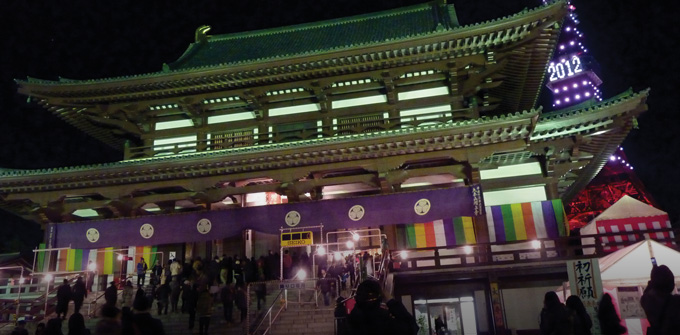
This article was published in the December issue of the expatriate-oriented magazine Tokyo Weekender, for which I was a regular contributor when I lived in Tokyo. This is my first article for them in two years or so. Enjoy....and Happy New Year!
 Anyone seeking to experience Japan at its festive best owes themselves at least one Japanese New Year, or o-shōgatsu (お正月), experience.
Anyone seeking to experience Japan at its festive best owes themselves at least one Japanese New Year, or o-shōgatsu (お正月), experience.Family considerations and homesickness often mean that many expatriates in Japan miss out on o-shōgatsu completely, but those staying in Japan for any length of time owe themselves at least one holiday season in the country.
While Japan has followed the western custom of celebrating New Year’s on January 1 since the late 19th century, all similarities with western New Year’s traditions end with the date.
O-shōgatsu is to Japan what Christmas is to Europe and the Americas—a beguiling mix of ancient solemnity and secular revelry.
Preparations for o-shōgatsu begin in earnest in the middle of December with the penning and delivery of the obligatory nengajō (年賀状) cards in a tradition that goes back to the late 19th century (see box for a modern twist).
These cards are sent to relatives, friends, bosses and coworkers and are deposited in specially marked mailboxes between December 15 and 25, for guaranteed delivery on January 1.
Celebrations typically begin a week ahead of January 1, starting with year-end bōnenkai (忘年会) parties (literally ‘forgetting the year’ parties) typically held at izakayas (pub-restaurants) by companies, groups of students and circles of friends. Those looking to book an izakaya during the last week of the year are advised to do so well ahead of time.
The New Year’s festivities themselves typically get started on the afternoon of December 31, with community members gathering at local shrine or temple grounds to pound mochi (pounded rice balls) with a shallow wooden pestle and a large mallet.
Once prepared, the mochi is then formed into totemic decorations called kagami-mochi (鏡餅), consisting of two balls of mochi with an orange on top, which hearken back to traditional ancestral worship.
The New Year is heralded by the ringing of temple bells all across Japan, which is said to erase the sins of the passing year and make way for the next.
More than anything, o-shōgatsu is about family and centres on the home. Families typically clean their houses from top to bottom during the days before January 1 to welcome in good fortune.
Following the morning temple or shrine visit, families typically return home for a traditional o-sechi ryōri (おせち料理) feast. Once upon a time, housewives made these by hand, but nowadays they are typically ordered from department stores.
Children receive gift money known as o-toshidama (お年玉), which comes in special decorative envelopes, and which some savvier parents use to teach money-management to their children.
O-shōgatsu is a joyous occasion and a celebration of renewal. Japanese people traditionally use it to celebrate various ‘firsts’—the first sunlight, the first laughter, the first dream and so on.
It is an infectious holiday, and should you have the good fortune to be able to celebrate it with a Japanese family, it is likely to be a treasured memory for many years to come.
On New Year's Greetings
The Japanese language has several different ways of saying 'Happy New Year'. Which one you choose depends in part on the level of formality or whether or not it actually is the new year yet. The best known greeting is akemashite omedetou gozaimasu (あけましておめでとうございます), which is typically translated to 'Happy New Year' and usually appears on New Year's cards together with the more formal kinga shinnen (謹賀新年).
However, neither of these greetings should be used prior to New Year's Day, when, for instance, wishing co-workers a happy new year before parting ways for the holidays. In this case, you should use the phrase yoi o-toshi o omukae kudasai (よいお年をお迎えください), which also shortens more casually to yoi o-toshi o. This basically means 'I wish you a joyful welcoming of the new year'. Or something like that.
Thank you for sharing this powerful article, your explanation is clear and very easy to understand. Please kindly visit our site to get more information about IT solution.SEO Services in Pakistan
ReplyDeleteWe appreciate you sharing this information about your project. You can easily contact us for Demolition Services In UAE and Dubai
ReplyDeleteJEEM Marketing Management, a prominent digital marketing agency in Dubai, excels in SEO, Local SEO, Social Media Marketing, Email Marketing, and PPC. Our content strategies enhance search engine rankings, and we offer expert services in Content Marketing, Web Design, Web Development, Mobile Marketing, Digital Consultancy, and Reputation Management. With a proven track record in the industry, we're the trusted partner for businesses seeking digital success in Dubai's dynamic marketing landscape.
ReplyDeleteFacilitate your legal union with the convenience of Online Marriage, streamlining the process for couples. Navigate the dissolution of marriage with the Khula Procedure in Pakistan, ensuring a legal and considerate approach to marital separation. These streamlined processes prioritize accessibility and adherence to legal protocols.
ReplyDelete